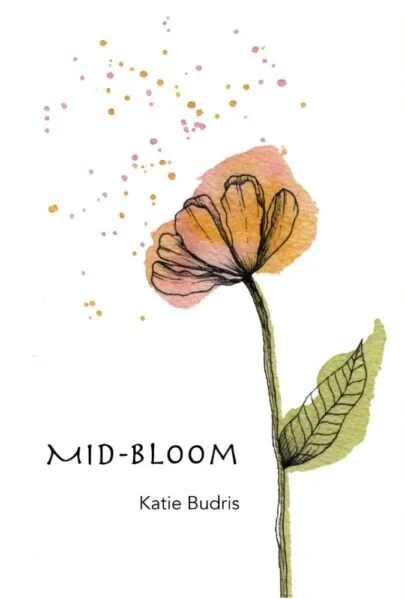Review of Katie Budris’ Mid-Bloom
Mid-Bloom
Finishing Line Press
$14.99
You can purchase a copy here (pre-orders ship August 13, 2021).
Reviewed by Abbey J. Porter
Katie Budris’ recent chapbook, Mid-Bloom, is about survival—survival of the narrator when, as a young teen, she loses her mother to cancer, and survival of the narrator herself when she too faces a cancer diagnosis.
In this 19-poem collection, South Jersey resident Budris explores the shape of loss and change brought about by disease, in part by looking to the natural world.
Budris opens the collection with “5:00pm, Weeknight,” a glimpse of the narrator’s life at 13—presumably, before her mother became ill. In this world, the narrator’s biggest concern is dealing with pre-algebra. Her mother, a piano instructor, taps out time in another room—an unseen but nonetheless comforting presence. Here, we can count on small pleasures and rituals:
Dad will mash the potatoes
just the way I like them, serve dinner on
Mom’s floral china, placemats, oak table, grace.
Budris introduces the frailty of life in “Keeping Things Alive,” in which she describes the plants lining her window ledge—"bamboo shoots, devil’s ivy, an elephant bush,/two cacti, one orange, one yellow.” She details the efforts made to meet the plants’ needs: new pots, different windows. But among the stems and leaves, Budris finds her blue Betta floating dead in his fishbowl—a discovery that shakes her. She scribbles a note for her sleeping partner: I’m afraid all the plants are dying. Her sentiment suggests that the Betta’s death heralds a larger, systemic failure.
In perhaps the most baldly confessional, unabashedly grief-shocked poem of the collection, Budris shares the immediate aftermath of her mother’s death in “The First Morning.” Her voice is frank and vulnerable:
I know it’s almost noon,
but I don’t want to get out of bed.
You are not here…
I’ve never done this
before. Said goodbye
forever.
Nature is a recurring theme in Budris’ poetry. In “How to Survive a Blizzard,” she observes how a family of cardinals reacts to a winter storm:
They know
the best protection from a blizzard
is not to fly, but to burrow, escaping
the elements by surrounding themselves
in a cave to keep warm, wait out the storm.
One feels these lines speak also to the “storm” Budris weathers, and that the birds’ method of sheltering in place applies to her as well.
“Mid-Bloom” is another poem that looks to the natural world. Budris reflects that “My whole adult life, I have failed to keep/ a plant alive beyond a few months.” She goes on to reminisce about planting flowers with her mother when she was a child.
I’m not sure where in the last thirty years I lost
my green thumb. But there
in the backyard, my mother knew
I was capable, nurturing, and strong. As if
she knew I would be on my own
much too young when she left this world
much too soon, a flower mid-bloom
The poet also writes of her own experience with breast cancer, from diagnosis to hair loss. In “If Things Were Otherwise,” this experience brings her closer to her mother as she imagines an alternate reality in which her mother still lives. She contemplates the effects of the disease that she shares with her mother, to whom she has “never felt closer,/connected by cancer.” She concludes, “This time, we’re both cancer patients./This time, I’d understand.” Ironically, the disease that took her mother’s life also binds the two women.
A poem that stands out to me is “Waiting for the Blue Line, Chicago.” Budris describes toeing and leaning out over the colored stripe running along the platform, meant to warn passengers to keep back.
She wonders whether
she could see the train coming better from down there—
white cyclops barreling
out of the darkness
The narrator balances, literally and figuratively, pulled by an impulse that reminds me of Poe’s “Imp of the Perverse”: “There is no passion in nature so demoniacally impatient, as that of him who, shuddering upon the edge of a precipice, thus meditates a Plunge.” I admire the subtlety and shiver-inducing quality of the poem. In addition, “Waiting” strikes at the heart of the survival issue, asking whether the narrator can withstand the most dangerous force of all—the one that vacillates within her.
These accessible poems share the writer’s pain and hard-won wisdom with a quiet ferocity, and their impact lingers like the scent of a summer bloom.
Abbey J. Porter writes poetry and memoir about people, relationships, and life struggles. She holds an MFA in creative writing from Queens University of Charlotte, an MA in liberal studies from Villanova University, and a BA in English from Gettysburg College. Abbey works in communications and lives in Cheltenham, Pa., with her two dogs.


